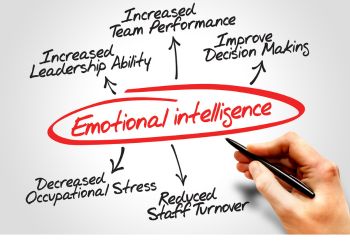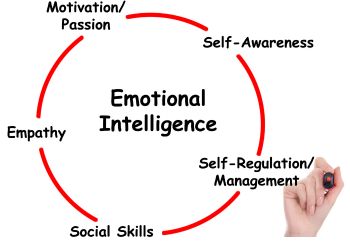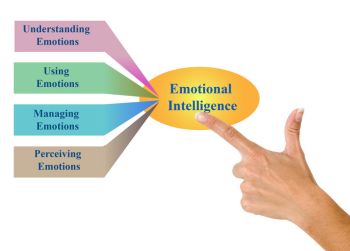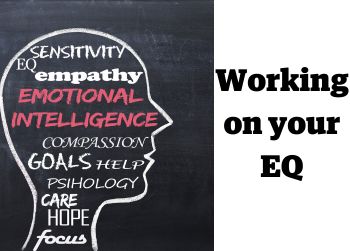
Last week, a now former Minister of the Crown, noted, in an apologetic statement to the media, that his …wife had often commented that he needed to work on his emotional intelligence and now was the time to take her “sage advice”.
But what is “emotional intelligence” (more often shortened to EI or EQ) and why is it necessary? Is it something you have or is it, like many leadership and interpersonal personal skills, something you can develop? If so, how do you “work on it”?
Psychology today says :
Emotional intelligence refers to the ability to identify and manage one’s own emotions, as well as the emotions of others. Emotional intelligence is generally said to include a few skills: namely emotional awareness, or the ability to identify and name one’s own emotions; the ability to harness those emotions and apply them to tasks like thinking and problem solving; and the ability to manage emotions, which includes both regulating one’s own emotions when necessary and helping others to do the same.
As a theory the concept of emotional intelligence was developed in the 1990s, however it was the publication of Daniel Goleman’s book Emotional Intelligence that brought the importance of EQ to the attention of the wider public, particularly the business world.
Some years later Emotional Intelligence was named one of the 25 “Most Influential Business Management Books” by TIME Magazine and 25 years on from the publication of that best selling book Goleman’s work is still referenced.
In this TED talk Goleman outlines strategies to become more emotionally intelligent.

To help you on your EQ/Emotional intelligence journey we’ve collated some resources for you.
Articles
5 things emotionally intelligent managers do differently
“… leaders with a high level of emotional intelligence are essential to a company’s success”.
3 signs you need to improve your emotional intelligence
“When you lack emotional intelligence, other people often do not want to work with you, to engage with your projects, or to go the extra mile to help you succeed”.
Developing Emotional Intelligence As A Leader
“In this article, we’ll outline ways of developing emotional intelligence as a leader based on the four elements in Daniel Goleman’s original research: Self-Awareness, Self-Regulation, Empathy, and Social Skill”.
Why emotional intelligence is important in leadership
“Leaders set the tone of their organization. If they lack emotional intelligence, it could have more far-reaching consequences, resulting in lower employee engagement and a higher turnover rate”.
Seven Traits Of An Emotionally Intelligent Leader
“… it goes without saying that emotional intelligence, which directly affects how a leader perceives, uses, understands and manages their own emotions and the emotions of others, is extremely important. It’s no longer just a nice-to-have skill, but one of the World Economic Forum’s Top Ten skills to thrive in the fourth industrial revolution (and it arguably underpins the other nine)”.
5 ways to display emotional intelligence (even if it’s not your strong suit)
Science-based lessons to help you boost your EQ.

Online courses via Linkedin Learning (freely available with Library membership)
Developing Your Emotional Intelligence
Executive coach and organizational psychologist Gemma Roberts explains what emotional intelligence (EQ) is and why it’s important. She helps you become more self-aware so that you can identify triggers that may hijack your performance. Gemma also helps you align your intentions and your impact so that you can build strong and collaborative relationships.
In this course, Brenda Bailey-Hughes defines exactly what emotional intelligence is and how it can help you manage your emotions and build stronger relationships. Learn how to understand others’ perspectives, balance empathy and accountability, demonstrate listening, and respond appropriately to a variety of verbal and nonverbal cues. Using these simple techniques, you can quickly improve your communication and make conversations at work and home more productive and satisfying.
Leading with Emotional Intelligence
In this course, Britt Andreatta shares how to boost your emotional quotient (EQ) to better lead teams, work with peers, and manage up. Learn what emotional intelligence is and how it factors in at work, and discover concrete techniques for raising your own EQ. This includes perceiving yourself accurately, exercising emotional self-control, understanding and managing your triggers, and developing empathy. Then, turn those lessons around to build your awareness of others and become a more inspiring—and effective—leader.
From the book collection
Emotional intelligence : a simple and actionable guide to increasing performance, engagement and ownership / Jacobson, Amy
“With the world in crisis, organisations are switching their key focus from product and sales to their people and mindset. Emotional intelligence is the ability to identify and manage one’s personal emotions and the emotions of others. Our emotions drive everything we do as humans, and organisations with people who can recognize these drivers in themselves and know how to interact with others with different communication styles will dramatically improve their performance, capability and staff engagement. This comprehensive and practical book cuts through the hype to simplify Emotional Intelligence into familiar language and actionable tools for immediate results.” (Catalogue)
The emotionally intelligent workplace : how to select for, measure, and improve emotional intelligence in individuals, groups, and organizations
“How does emotional intelligence as a competency go beyond the individual to become something a group or entire organization can build and utilize collectively? Written primarily by members of the Consortium for Research on Emotional Intelligence in Organizations, founded by recognized EI experts Daniel Goleman and Cary Cherniss, this groundbreaking compendium examines the conceptual and strategic issues involved in defining, measuring and promoting emotional intelligence in organizations. The book’s contributing authors share fifteen models that have been field-tested and empirically validated in existing organizations. They also detail twenty-two guidelines for promoting emotional intelligence and outline a variety of measurement strategies for assessing emotional and social competence in organizations.” (Catalogue)
On emotional intelligence
“In his defining work on emotional intelligence, Dan Goleman has found that it is twice as important as other competencies in determining outstanding leadership.If you read nothing else on emotional intelligence, read these 10 articles. We’ve combed through hundreds of articles in the Harvard Business Review archive and selected the most important ones to help you monitor and manage your emotions–and boost your success.” (Catalogue)
Emotional intelligence : why it can matter more than IQ / Goleman, Daniel
“Everyone knows that high IQ is no guarantee of success, happiness, or virtue, but until Emotional Intelligence, we could only guess why. Daniel Goleman’s brilliant report from the frontiers of psychology and neuroscience offers startling new insight into our ‘two minds’– he rational and the emotional — and how they together shape our destiny”–Publisher website.” (Catalogue)
Also available as EBook Borrowbox, EBook Overdrive, EAudiobook Overdrive,
EQ applied : the real-world guide to emotional intelligence : how to make emotions work for you, instead of against you / Bariso, Justin
“In this age of social media attacks, constant distraction, and rampant corruption, a high emotional intelligence quotient, or EQ, is more important than ever. Justin Bariso brings the concept of emotional intelligence up to date and into the real world, combining scientific research with high-profile examples and personal stories. For example, in EQ Applied you’ll: – examine one of the most famous business stories of all time-Steve Jobs’s exit and return to Apple-from a completely different angle . . . and reveal a major lesson in the process – learn how to control your emotional reactions-and see how a modern day “miracle” brought this ability to life – learn how to break bad habits and escape “emotional hijacks” – discover how emotional intelligence can be used for evil-and how you can protect yourself Learn how to make emotions work for you, instead of against you. That’s EQ Applied.” (Catalogue) EAudiobook Overdrive
Fully human : 3 steps to grow your emotional fitness in work, leadership, and life / Packard, Susan
“HGTV cofounder Susan Packard launches the next chapter in emotional intelligence (EQ), and shows you how to increase your personal satisfaction and productivity–in work and life–via her three-step path toward EQ Fitness. Emotions can sink us, or they can power us like fuel to succeed. Many of us show up for work, and life, feeling lonely even in a room full of people, or bringing unproductive emotions into work, like anger or fear. You don’t have to feel this way. Susan Packard offers an accessible new guidebook to grow your emotional fitness, and it’s arrived just in time, as technology is quickly becoming our main interface for communication. No matter where you are in your career, success is an inside job. Packard lays out how to develop interdependent work relationships, and for leaders, how to build healthy company cultures. Packard introduces us to successful people, and companies, that are rich with ‘connector’ emotions like hope, empathy and trust-building. She tackles unconventional topics, like how workaholism keeps us emotionally adolescent, and how forgiveness belongs in the workplace too. Packard shares her EQ Fit-catalyzed success at HGTV and the stories of the executives she coaches in mindfulness and other emerging techniques, and she teaches an ‘inside out’ practice of self-discovery, which helps you uncover unproductive emotions, and dispel them. The best leaders balance power and grace, and everyone can effectively use resilience–an ability to endure tough situations and make tough decisions, and vulnerability, a willingness to open up, change, and admit when we need help. She offers new tools to bring our strongest emotional selves to work each day”– Provided by publisher.” (Catalogue)
Also available as ebook
The language of emotional intelligence : the five essential tools for building powerful and effective relationships / Segal, Jeanne
“Learn how to increase your emotional intelligence with five simple tools It’s no secret that emotional intelligence plays a crucial role in your relationships. But how do you apply these specialized skills in everyday life? It’s easy–with this practical, ready-to-use guide by a renowned expert in the field of emotional intelligence and communication. Using the latest research and true-to-life examples, Dr. Jeanne Segal’s step-by-step program shows you how to incorporate the five basic tools of emotional intelligence to enhance your relationships in the workplace, at home, and in all areas of your life. You’ll learn how to: “Read” other people Make powerful connections Defuse arguments and conflicts Repair wounded feelings Understand nonverbal cues Build stronger, more satisfying relationships Packed with simple exercises, revealing self-quizzes, and proven calming techniques, this user-friendly guide can help you reach into the hearts and minds of others–sometimes without saying a word! Once you master the language of emotional intelligence, you’ll be able to form mutually rewarding bonds that last a lifetime. Dr. Segal’s method is a complete, hands-on approach to one of the most important life skills you will ever learn.” (Catalogue)
Emotional intelligence at work : the untapped edge for success / Weisinger, Hendrie
“Access an Untapped Source of Success At long last, a book directed to the working world that acknowledges and demonstrates how managing our emotions and dealing with the feelings of others increases the bottom line. Practical, practical, practical –Rita McGlone, assistant director of executive education, The Wharton School of Business Experts now acknowledge that emotional intelligence (EI) is perhaps the most crucial determinant of success in the workplace. And unlike IQ or other traditional measures of intelligence, EI can be developed and dramatically increased. This unprecedented book demonstrates how to master the core competencies of EI, abilities that include self-motivation, high self-awareness, mood management, and emotional mentoring. In addition, it includes scores of real-world examples and dozens of practical exercises that accelerate the process, along with step-by-step approaches to mastering a variety of EI techniques.” (Catalogue)
Self-awareness
“Self-awareness is the bedrock of emotional intelligence. It enables you to see your talents, shortcomings, and potential–but you won’t be able to achieve it through personality tests or quarterly feedback alone. This book will teach you how to understand your thoughts and emotions, how to persuade colleagues to share what they really think of you, and why self-awareness will spark more productive and rewarding relationships with your employees and bosses. This volume includes the work of: – Robert Steven Kaplan – Susan David – Tasha Eurich – H. James Wilson– Provided by publisher.” (Catalogue)
If you need more information please contact the Prosearch team at the library. We can help you find information across a range of perspectives and resources. All enquiries are treated in confidence.


